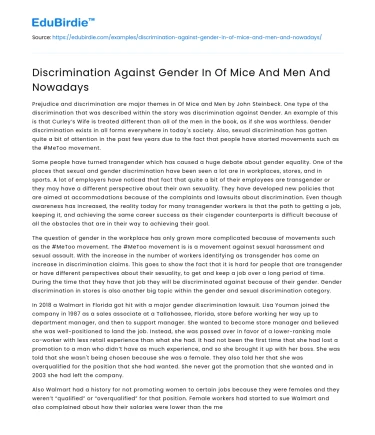Prejudice and discrimination are major themes in Of Mice and Men by John Steinbeck. One type of the discrimination that was described within the story was discrimination against Gender. An example of this is that Curley’s Wife is treated different than all of the men in the book, as if she was worthless. Gender discrimination exists in all forms everywhere in today's society. Also, sexual discrimination has gotten quite a bit of attention in the past few years due to the fact that people have started movements such as the #MeToo movement.
Some people have turned transgender which has caused a huge debate about gender equality. One of the places that sexual and gender discrimination have been seen a lot are in workplaces, stores, and in sports. A lot of employers have noticed that fact that quite a bit of their employees are transgender or they may have a different perspective about their own sexuality. They have developed new policies that are aimed at accommodations because of the complaints and lawsuits about discrimination. Even though awareness has increased, the reality today for many transgender workers is that the path to getting a job, keeping it, and achieving the same career success as their cisgender counterparts is difficult because of all the obstacles that are in their way to achieving their goal.
Save your time!
We can take care of your essay
- Proper editing and formatting
- Free revision, title page, and bibliography
- Flexible prices and money-back guarantee
The question of gender in the workplace has only grown more complicated because of movements such as the #MeToo movement. The #MeToo movement is is a movement against sexual harassment and sexual assault. With the increase in the number of workers identifying as transgender has come an increase in discrimination claims. This goes to show the fact that it is hard for people that are transgender or have different perspectives about their sexuality, to get and keep a job over a long period of time. During the time that they have that job they will be discriminated against because of their gender. Gender discrimination in stores is also another big topic within the gender and sexual discrimination category.
In 2018 a Walmart in Florida got hit with a major gender discrimination lawsuit. Lisa Youman joined the company in 1987 as a sales associate at a Tallahassee, Florida, store before working her way up to department manager, and then to support manager. She wanted to become store manager and believed she was well-positioned to land the job. Instead, she was passed over in favor of a lower-ranking male co-worker with less retail experience than what she had. It had not been the first time that she had lost a promotion to a man who didn’t have as much experience, and so she brought it up with her boss. She was told that she wasn't being chosen because she was a female. They also told her that she was overqualified for the position that she had wanted. She never got the promotion that she wanted and in 2003 she had left the company.
Also Walmart had a history for not promoting women to certain jobs because they were females and they weren’t “qualified” or “overqualified” for that position. Female workers had started to sue Walmart and also complained about how their salaries were lower than the men's salary. Now all of the female workers are now suing the company for discrimination against their gender. Gender discrimination in sports is another big topic that is going around. An Olympic champion named Caster Semenya of South Africa went to the Court of Arbitration for Sports on Monday and challenged some of the rules that would force her to lower her testosterone levels. There are a few controversial rules that would force certain athletes or those with 'differences of sexual development' to take drugs to lower testosterone levels if they want to compete. The rules were supposed to be introduced last November but have been put on hold because of the upcoming hearing that Semenya is supposed to attend. A final decision is expected to be decided by the end of March.
In response to this report, the IAAF was saying that it was referring to others in general, not just to Semenya only. It was intended to make sure that any DSD athlete is classified as a male. Semenya is not alone. Two other athletes who finished behind Semenya in the Rio Olympics 800m, have also been questioned about their testosterone levels because of their performance. Their names were Francine Niyonsaba of Burundi and Margaret Wambui of Kenya. This goes to show that gender discrimination is within sports and gender discrimination isn't only in the United States, it's all over the world. These examples of gender discrimination go to show the fact that it has become a huge topic over the past few years and a lot of things involving people's sexuality and gender have changed drastically. Gender discrimination in the book is somewhat close to some of the examples that were given. For example, Curley’s wife was treated differently because she was a woman and some of the workers were treated differently because of their gender. As you can see this is how Gender discrimination was big in the book and how it’s big in real life.






 Stuck on your essay?
Stuck on your essay?

